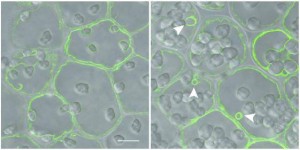It is that time of the year again, when your neighbours brag about all the cheap items that they bring back from the south. But believe it or not, the one common thing that all these Canadian shoppers who pass the border for the US Black Friday sale come back with is neither discounted clothing nor electronics. Rather, it is gas.
The price of fuel has been skyrocketing over the past few years, compelling the Canadian industry to seek alternatives to fossil fuels. One of the most popular alternatives lies in the area of biofuels, a renewable and economical energy source derived from the products of living organisms such as the sugar secretions of plants. However, the problems with production efficiency and environment sustainability affiliated with biofuels have hindered their general adaptation in the industries.
Last year, an attempt to resolve the problem was done when Gabriel Levesque-Tremblay and his colleagues at the University of British Columbia conducted a research on the role of vesicle transport of sugars from the Golgi Apparatus to the cell wall of a small flowering Arabidopsis plant.
With prior knowledge of the functions of a particular plant gene, which encodes proteins that play a significant role in cellular secretion, Gabriel’s research team inhibited the expression of this gene, namely the ECHIDNA gene, in plant seeds to study the changes in the activity of secretory vesicles containing the polysaccharides, or sugars.

Granule accumulation inside the cell. Credit:http://pcp.oxfordjournals.org/ content/early/2013/09/20/pcp.pct129. full.pdf+html
They found that without the expression of the ECHIDNA gene, the cells are still able to transport sugars across the Golgi apparatus. However, the secretory vesicles are unable to fuse with the cell wall of the plant, resulting in clusters of vesicles accumulating near the cell membrane. In other words, without the proper functioning of this ECHIDNA gene, the plant is unable to secrete the sugar products that the industry needs to extract to use as biofuels.
The following podcast introduces the two novel techniques that Gabriel’s study used to knock off the gene of interest in order to study the genetic effect of proteins on the plant’s vesicular transport and subsequently the secretion of sugars.
Audio clip: Adobe Flash Player (version 9 or above) is required to play this audio clip. Download the latest version here. You also need to have JavaScript enabled in your browser.
Gabriel’s study suggests that the ECHIDNA gene, as well as perhaps other unidentified genes in plants, plays a critical role in controlling the vesicular fusion with the cell wall. Consequently, the ECHIDNA gene also regulates the efficiency of plant secretion. This opens window into increasing the secretion yield of plants. Engineers may be able to modify the genes to improve the fusion of cellular vesicles with cell walls and enhance the efficiency of cellular secretion. Ultimately, this could allow more sugar extractions from the plants to be used as biofuels and potentially lower gas prices
For more details about the experiment and more examples of the industrial applications of biofuel, check out the following video:

–Ziharrphil Magnaye, Connie Lee, Nick Hsieh (Group 3)
References:
- Cell wall polysaccharides are mislocalized to the vacuole in echidna mutants
- Biofuels
- Golgi Apparatus
- Arabidopsis Biological Resource Center
- Conserved Arabidopsis ECHIDNA Protein Mediates Trans-Golgi-Network Trafficking and Cell Elongation



